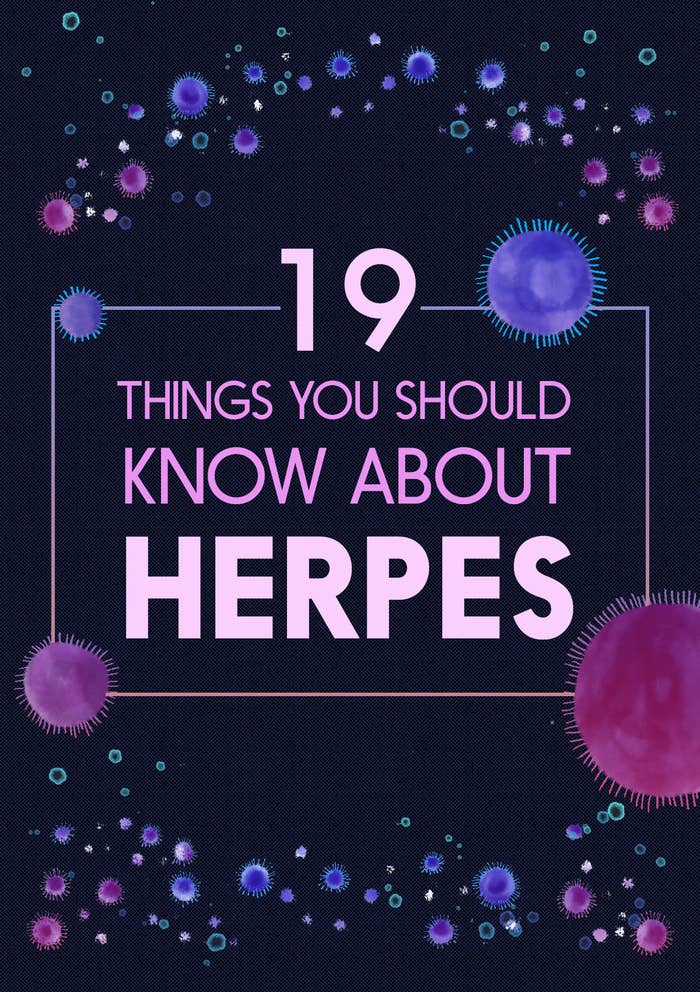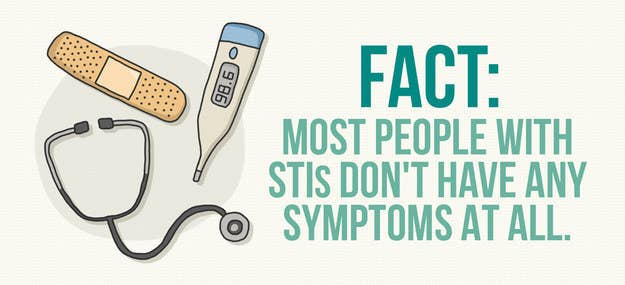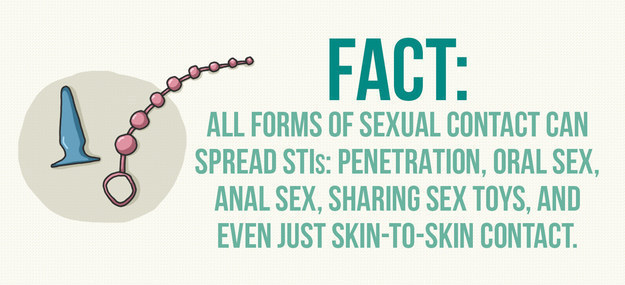
1. Pretty much everyone has it.
OK, so the majority of people have it. Just this year, the World Health Organization released a study that estimates two thirds of people in the world (67%) have the HSV-1 strain of the herpes simplex virus — that’s approximately 3.7 billion people worldwide. While HSV-1 typically refers to oral herpes infections, it also includes some genital infections. The new report estimates that half of the HSV-1 infections in people between the ages of 15–49 are actually genital infections transmitted via oral-to-genital contact. The Center For Disease Control (CDC) estimates that 1 in 6 people have genital herpes.
2. Even though so many people have it, a large number of them have no idea.
Dr. Vanessa Cullins, Vice President of External Medical Affairs at Planned Parenthood, says that many, if not most, of the people who have herpes don’t know that they have it, because they may not show signs or symptoms of it.
According to Melissa King, a psychotherapist who runs a support group for women with herpes in New York City, when someone finds out they’ve gotten herpes from a partner, there’s often immediately an assumption that the partner knew that they had it and lied, or that they were cheating. “But the reality is that in a lot of cases, people don’t know that they have it,” King tells BuzzFeed.
Jamie*, 29, is HSV-positive and contracted herpes from her husband. But, she explains, “He only had one outbreak when he was young and that was it. So he didn't realize what it was.” Jamie was infected three years into their relationship simply because he had outbreaks that infrequently. She says, “I was worried he had cheated on me, but then found similar stories online, and our outbreak patterns underscore that what happened is very possible.”

3. There are two different kinds of herpes.
There’s herpes simplex virus type 1 (HSV-1) and herpes simplex virus type 2 (HSV-2). “HSV-1 and HSV-2 are different but closely related viruses,” says Dr. Christine Johnston, MPH, who is the Associate Medical Director of the Virology Research Clinic at the University of Washington. Johnston explains that both are transmitted through close mucosal or skin contact with infected secretions. HSV-1 primarily causes oral outbreaks, also known as cold sores, and HSV-2 usually causes genital outbreaks. But HSV-1 can also cause genital outbreaks through oral-to-genital contact, according to the CDC. According to Johnston, genital HSV-1 is less likely to recur than HSV-2, and there’s less asymptomatic shedding (transmitting the virus without realizing it) with HSV-1 than with HSV-2.
4. Outbreaks aren’t the only symptoms of herpes.
In fact, “atypical symptoms” are the reason that so many people don’t know they have herpes. Their reality is nothing like the scary images that pop up when you Google image search the term. Atypical symptoms include things like nerve pain, achy muscles, itching, and tingling. Some women I talked to reported being misdiagnosed with frequent yeast infections or bacterial infections before receiving their herpes diagnosis. “With your first episode, you can have fever, fatigue, and flu-like symptoms,” says Cullins.
5. Routine herpes screening is not currently recommended by the CDC.
This is because, according to the U.S. Preventive Services Task Force (USPSTF), which makes recommendations on screenings, there is “no evidence that screening asymptomatic adolescents and adults...for HSV antibody improves health outcomes or symptoms or reduces transmission of disease.”
In fact, the USPSTF report says that “the benefits of screening are minimal, at best, and the potential harms outweigh the potential benefits.” The test can cause needless anxiety if you don’t actually experience symptoms, or if it turns out to be a false positive.
Johnston notes that “there can be false positive test results with HerpeSelect ELISA (the most commonly used test), particularly with low index values, so the CDC now recommends confirming low index values with a second test.”
All this means that if you are concerned about herpes, you will need to talk to a doctor and request the test yourself. Options for testing include taking a culture if you have outbreak symptoms, like a lesion, blister, or ulceration, or a blood test if you don’t, which will detect any antibodies.
6. It’s possible to have herpes and never have an outbreak.
Cullins explains that even if you’ve never had an outbreak, if you’ve been exposed to herpes, it lies dormant in your body. A blood test could reveal antibodies for HSV-1 and/or HSV-2, which means that you have been exposed to the infection in your past, you have been infected, and you have developed antibodies because your body has or is fighting the infection.
“The virus stays in the nerves and doesn’t come out until you are immunosuppressed, and that’s when the herpes virus may reappear,” says Cullins. That’s why it’s so easy to have the virus without realizing you do.
7. You can pass herpes on to a partner even if you’re not having an outbreak.
Herpes is transmitted via skin-to-skin contact, not through blood or saliva. Cullins explains that someone with HSV can be shedding the herpes virus without having an outbreak (known as asymptomatic virus shedding), and infect somebody that way. Suppressive antiviral medications, like acyclovir or valacyclovir, inhibit HSV replication, which decreases shedding but does not completely eliminate it, says Johnston.
A 2004 study in the New England Journal of Medicine found that suppressive therapy decreases the risk of HSV-2 transmission from symptomatic, infected partners to uninfected partners by 48%. So “the risk of transmission is significantly reduced, but cannot be eliminated even with suppressive therapy,” Johnston explains, and she stresses that the virus can be passed along even without signs or symptoms.

8. Generally, you get fewer outbreaks the longer you have the infection.
Cullins explains that the first, or initial, outbreak is usually the worst, and “over time when you have recurrent episodes, you may not have systemic symptoms” or frequent symptoms. But everyone’s body and immune system reacts to the virus differently; while some people may never have many outbreaks, other people may be more chronically symptomatic. The National Institutes of Health indicate that infrequent outbreaks, around one or two per year, are not uncommon.
9. Outbreaks might be much more frequent when you’re pregnant.
According to a study in the New England Journal of Medicine, more than 30% of pregnant women in the United States have genital HSV. During pregnancy, people are immunocompromised so that their body doesn’t fight the fetus as a foreign invader. And when a person’s immune system is weakened, they are more likely to have herpes outbreaks. According to Cullins, “Pregnancy is the time period when [a provider] really wants to know whether or not the person has had herpes in the past,” so they can protect the pregnant person and their infant from a herpes infection.

10. Herpes can be dangerous if it’s transmitted from a mother to a baby, but as long as you don’t have an outbreak during labor, vaginal delivery is safe.
“You don’t want an infant delivered through infected birth canal or vulva because the infant can be infected,” Cullins explains. A neonatal herpes infection is a real risk because it can cause problems with brain development and eye and skin infections, or even be fatal. And since there is more risk for transmission from mother to baby during an initial outbreak than during a recurrent outbreak, the CDC stresses that it’s incredibly important for pregnant women to avoid contracting a new herpes infection.
Cullins says pregnant women “will usually be referred suppressive medications from 36 weeks onward in order to prevent an outbreak prior to delivery.” Many people with herpes are able to have successful vaginal deliveries this way. If someone does have an outbreak at the time of delivery, a c-section will be performed.
11. One type of herpes is not “worse” than the other, although genital herpes is definitely more stigmatized.
Even though the majority of people in the world have HSV-1 and may get cold sores, and even though genital herpes can be caused by both HSV-1 and HSV-2, genital herpes still tends to carry much more shame and stigma in our society. But any type of herpes is essentially just a skin condition that flares up every once in a while.

12. The negative stigma around herpes can actually be worse than herpes itself.
A 2014 article in The Atlantic reported that “The stigma of the virus…is usually worse than the symptoms themselves, as it affects dating, social life and psychological health.” King says that for the people she sees in her herpes support group, the stigma is the biggest issue that they face.
“Most people don’t give their symptoms much of a second thought,” she says, “because for most of them, the symptoms are minor and go away after a couple days.” She says what they really struggle with is the question and reality of what it means to have herpes in our society.
13. Prevention makes it very possible for an HSV+ person to have sex or be in a relationship with an HSV- person and never transmit the infection.
Particularly when someone is on suppressive antiviral medication and practicing safer sex, risk of transmission can be greatly reduced. Cullins suggests female condoms (condoms that go inside the vagina and cover most of the vulva, though it's important to note that not all people with vaginas are female) to provide the most protection against transmission, though condoms that go over the penis will protect what they cover.
According to Cullins, there are no standardized guidelines from the CDC for suppressive therapy through medication, but it is an option that people with HSV should talk to their healthcare providers about. “If a person knows they have had herpes in the past that has affected their genitals, they can take suppressive therapy — for example, 500 mg of valacyclovir daily.” While it won’t prevent outbreaks, it will prevent asymptomatic virus shedding. Preventing exposure to the virus through both medication and a physical barrier can be very effective.
14. It’s possible to contract HSV from activities other than sexual intercourse, and to have HSV even if you’ve never had sex with someone.
“Herpes is caused by sexual intimacy and contact with a person who is actively shedding the herpes virus,” says Cullins. If you have HSV-1, that shedding could happen through the mouth or a cold sore, which means that the virus can be transmitted through kissing, or just sharing a drink. If you have herpes that affects the genitals, it can be transmitted from sharing sex toys, grinding, or even mutual masturbation — any activity where the virus can be transmitted from one person to another through skin-to-skin or mucosal contact.
15. Having herpes doesn’t necessarily mean that someone was reckless or practicing unsafe sex, nor does it tell you anything about someone’s number of partners or sexual behavior.
“Someone having HSV doesn't mean that they were reckless or irresponsible with their sex life,” says Sara, age 30. “I used condoms with all my partners, and I still caught it.” For Jamie, who contracted herpes from her husband three years into their monogamous relationship, he was her first and only sexual partner. And she says that he contracted it from one of his very first sexual encounters. No matter how and why someone contracted the virus, it doesn't erase their humanity and right to respect.

16. Abuse or sexual violence can complicate someone’s herpes diagnosis.
“A lot of folks will either stay in or enter abusive relationships after getting diagnosed with an STI because they don’t feel they deserve better,” says Ella Dawson, a 23-year-old writer who has been HSV+ since 2013. “They might believe they’re lucky to be in a relationship at all."
She explains that their confidence and identity have just received massive blows because societal stigma tells them that an STI makes them worthless, unlovable, and unfuckable. All those negative messages may make being treated terribly by a partner seem justified, even fair.
King says that when someone contracts herpes in an abusive relationship, they may stay in the relationship longer because their partner makes them afraid that no one else will want them. Dawson says, “The only person who has ever been unkind to me because I have herpes was the abusive partner I was with when I got diagnosed."
In addition, when someone receives an STI from an abusive partner or from a sexual assault, the healing process becomes even more complicated, isolating and dangerous. They can’t talk about their STI without talking about how they got it, and it may feel safer for them to retreat inward.
17. But having herpes may actually help boost your self-esteem — and your standards.
According to Gina*, 21, “A herpes diagnosis is very shaking and it gives you the opportunity to look inward and really find what you love about yourself.” Gina says she has even better self-esteem than prior to finding out she had HSV. She explains, “You learn not to lower your standards, because you start to pick out who it is worth disclosing to and who isn't.”
18. Talking about herpes doesn’t necessarily make someone “brave.”
“I kind of can't stand when people tell me how ‘brave’ I am for talking about it,” says Lachrista Greco, 30, who was diagnosed with herpes almost two year ago. That kind of narrative can actually perpetuate the stigma around the virus. By insinuating that talking about something makes someone brave, the implication is that that thing shouldn’t be talked about at all.
19. People with herpes are more than their diagnosis.
People with herpes are just as deserving of love as people without it. Having herpes is just one more thing about someone. “The majority of the women I’ve worked with go on to have partners and herpes becomes a non-issue in their life,” King says. “You can get over it and go on to have a normal life.”
*Names marked with an asterisk have been changed at the person’s request.
